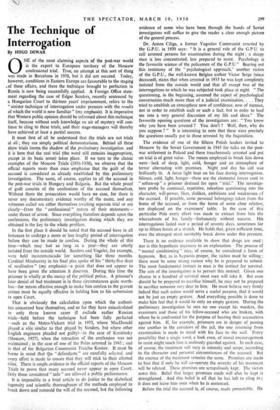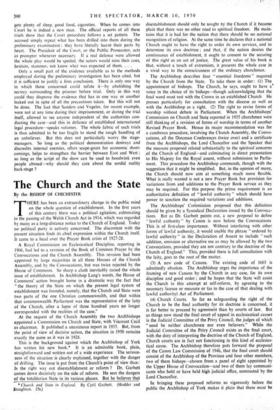The Technique of Interrogation
By HUGO DEWAR
ONE of the most alarming aspects of the post-war world is the export to European territory of the Moscow confessional trial., True, an attempt at this sort of thing was made in Barcelona in 1938, but it did not succeed. Today, however, conditions in Eastern Europe are favourable to the staging of these affairs, and there the technique brought to perfection in Russia is now being successfully applied. A Foreign Office state- ment regarding the case of Edgar Sanders, recently sentenced by a Hungarian Court to thirteen years' imprisonment, refers to the " sinister technique of interrogation under pressure with the results of which the world is now familiar" (my emphasis). It is imperative that Western public opinion should be informed about this technique itself, because without such knowledge an air of mystery will con- tinue to cling to these trials, and their stage-managers will thereby have achieved at least a partial success.
It must first of all be understood that the trials are not trials at all ; they are simply political demonstrations. Behind all these show trials looms the shadow of the preliminary investigation, and it is here that the real trial (the word still remains inappropriate, yxcept in its basic sense) takes place. If we turn to the classic examples of the Moscow Trials (1936-1938), we observe that the official reports more than once emphasise that the guilt of the accused is considered as already established by this preliminary investigation. The same, of course, applies to all the "accused in the post-war trials in Hungary and Bulgaria. But the whole proof of guilt consists of the confessions of the accused themselves. Without them the prosecution would have no case, for there is never any documentary evidence worthy of the name, and any witnesses called are either themselves awaiting separate trial or are clearly—from the " confessional " nature of their statements— under threat of arrest. Since everythingtherefore depends upon the confessions, the preliminary investigation during which they are obtained is the key to the whole problem.
In the first place it should be noted that the accused have in all instances to undergo a more or less lengthy period of interrogation before they can be made to confess. During the Whole of this time—which may last as long as a year—they are utterly isolated from the outside world. Sanders and Vogeler, for example, were held incommunicado for something like three months. Cardinal Mindszenty in his final plea spoke of his "thirty-five days of meditation" (my emphasis)—a point that does- not appear to have been given the attention it deserves. During this time the prisoner is wholly at the mercy of the political police. A prisoner's later denial of bad treatment is in these circumstances quite worth- less—for means effective enough to make him confess to th6 gravest crimes must be-equally effective in holding him to his submission in open Court.
That is obviously the calculation upon which the authori- ties concerned base themselves, and so far they have miscalculated in only three known cases .(I exclude earlier Russian trials—held before the technique had been fully perfected —such as the Metro-Vickers trial in 1933, where MacDonald played a role similar to that played by Sanders, but where other English engineers pleaded not guilty)—in the case of Krestinsky (Moscow, 1937), when the retraction of the confession was not maintained ; in the case of one of the Poles arrested in 1945; and in that of the Bulgarian Communist Traicho Kostov. It must be borne in mind that the " defendants " are carefully selected, and every effort is made to ensure that they will stick to their allotted roles. There is ample evidence in the official reports of the Moscow Trials to prove that many accused never appear in open Court. Only those considered " safe " are allowed a public performance.
It is impossible in a brief article to do justice to the diabolical ingenuity and scientific thoroughness of the methods employed to break down and remould the will of the accused, but the following - evidence of some who have been through the hands of Soviet investigators will suffice to give the reader a clear enough picture of the general process.
Dr. Anton Ciliga, a former Yugoslav Communist arrested by the G.P.U. in 1930 says: "It is a general rule of the G.P.U. to call arrested persons for examination during the night ; a sleepy man is less concentrated, less prepared to resist. Psychology is the favourite science of the policemen of the G.P.U." Bearing out this testimony of the "psychological approach'," another victim of the G.P.U., the well-known Belgian author Victor Serge (since deceased), states that when arrested in 1933 he was kept completely isolated from the outside world and that all except two of the interrogations to which he was subjected took place at night. "The questioning, in the beginning, assumed the aspect of psychological conversation much more than of a judicial examination. . . . They tried to establish an atmosphere now of confidence, now of menace, not in order to establish such or such a fact, but in ordei to lead me into a very general discussion of my life and ideas." The favourite opening questions of the investigators are: "You know why you have been arrested ? You don't ? Well, then, why dq you suppose ? " It is interesting to note that these were precisely the questions usually put to those arrested by the Inquisition.
The evidence of one of the fifteen Polish leaders invited to Moscow by the Soviet Government in 194-5 for talks on the post- war settlement in Poland and there treacherously arrested and put on trial is of great value. The means employed to break him down were—lack of sleep, light, cold, hunger and an atmosphere of terror alternating with promises. Night and day his cell was brilliantly lit. A fierce light beat on his face during interrogation. Silence, cold, light, hunger—these are the elemental forces used to " soften-up " a prisoner destined for open "trial." The investiga- tors probe by continual, repetitive, relentless questioning into the character, will-power, likes, dislikes, ambitions and weaknesses cf the accused. If possible, some personal belongings taken from the home of the accused, or from the home of some close relative, are displayed on the examiners' table. In the case of this particular Pole every effort was made to extract from him the whereabouts of his family—fortunately without success. His interrogations lasted over a period of seventy days, sometimes for up to fifteen hours at a stretch. He holds that, given sufficient time, even the strongest must inevitably break down under this pressure.
There is no evidence available to show that drugs are used ; nor is this hypothesis necessary to an explanation. The process of "mental conditioning" may, of course, be considered a form of hypnosis. But, as in hypnosis proper, the victim must be willing ; there must be some strong reason why he is prepared to submit. The most fundamental instinct in man is the instinct for survival. The aim of the investigators is to pervert this instinct. Given one chance in a hundred of survival most men will take it. But even should he be prepared to sacrifice himself, he may not be prepared to sacrifice someone very dear to him. He must believe very firmly Indeed that such action would serve a useful purpose, that it would not be just an empty gesture. And everything possible is done to make him feel that it would be only an empty gesture. During the preliminary investigation he sees no one except his warders, the examiners and those of his fellow-accused who are broken, with whom he is confronted for the purpose of hearing their accusations against him. If, for example, prisoners are in danger of passing one another in the corridors of the jail, the one returning from examination is made to stand with his face to the wall. Every possibility that a single word, a look even, of moral encouragement to resist might reach him is zealously guarded against. In each case, of course, the treatment will vary in intensity and scope, according to the character and personal circumstances of the accused. But the essence of the treatment remains the same. Promises are made to him that if only he will co-operate the severity of his treatment will be relaxed. These promises are scrupulously kept. The victim notes this. Belief that larger promises made will also be kept is strengthened. And this belief is all that he has left to cling to ; it does not leave him even when he is sentenced.
Before the trial the accused is, of course, made presentable. He
gets plenty of sleep, good food, cigarettes. When he comes into Court he is indeed a new man. The official reports of all these trials show that the Court procedure follows a set pattern The accused simply repeat what has been drilled into them during the preliminary examination ; they have literally learnt their parts by heart. The President of the Court, or the Public Prosecutor, acts as prompter whenever necessary. If a real defence were allowed the whole play would be spoiled, the actors would miss their cues, hesitate, stammer; not know what was expected of them. . . .
Only a small part of the evidence available as to the methods employed during the preliminary investigation has been cited, but it is sufficient to justify a firm conclusion. There is only one way in which those concerned could refute it—by abolishing the secrecy surrounding the prisoner before trial. Only in this way could they disprove the evidence that has in one way or another leaked out in spite of all the precautions taken. But this will not be done. The fact that Sanders and Vogeler, for recent example, were not at any time during their imprisonment, or during the trial itself, allowed to see anyone independent of the authorities con- ducting the case—and this in defiance of established international legal procedure—speaks volumes. The whole fabric of such trials is thus admitted to be too fragile to stand the rough handling of an unbeliever. But this does not particularly worry the stage- managers. So long as the political demonstration destroys and discredits internal enemies, offers scape-goats for economic short- comings, helps to strengthen the barrier between East and West ; so long as the script of the show can be used to hoodwink even people abroad—why should they care about the sordid reality back-stage ?



































 Previous page
Previous page